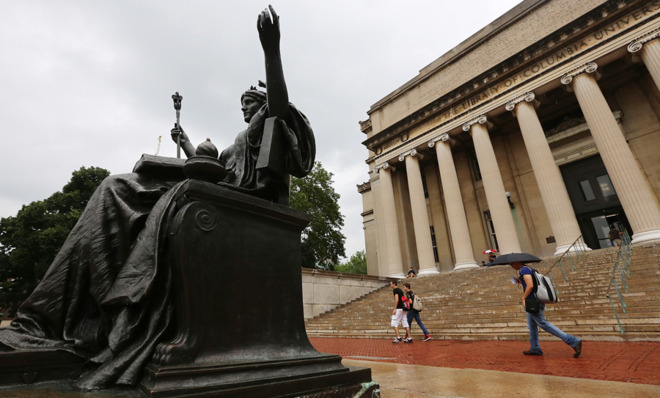How a Louis Vuitton bag can explain the higher education bubble
In America, the markets for luxury handbags and college degrees both produce what are called "Veblen goods"

A free daily email with the biggest news stories of the day – and the best features from TheWeek.com
You are now subscribed
Your newsletter sign-up was successful
If you happen to have $31,500 lying around, you could buy a Louis Vuitton PM Showgirl handbag. Or you could spend almost exactly the same sum to pay for one year's worth of tuition (not including room and board) at an average American four-year private college.
The handbag and the college degree have more in common than you might think. In America, the markets for luxury handbags and higher education both produce what are called "Veblen goods."
More than a century ago, the sociologist Thorstein Veblen coined the term "conspicuous consumption" to describe the practice of buying luxury goods in order to display social status. In its purest form, conspicuous consumption involves purchasing expensive goods precisely because they are expensive, which means that the true conspicuous consumer will have what economists call an inverted demand curve.
The Week
Escape your echo chamber. Get the facts behind the news, plus analysis from multiple perspectives.

Sign up for The Week's Free Newsletters
From our morning news briefing to a weekly Good News Newsletter, get the best of The Week delivered directly to your inbox.
From our morning news briefing to a weekly Good News Newsletter, get the best of The Week delivered directly to your inbox.
Normally, when the price of a good rises, demand for it will fall. Demand for a Veblen good, by contrast, goes up as it becomes more expensive. The purpose of buying it is to display wealth, so the fewer people that can afford to buy a good, the more valuable it becomes to conspicuous consumers.
Veblen goods are a type of positional good: that is, a good whose value is determined by how much one has of it relative to someone else.
For example, if two people are hungry, both are better off if they each acquire a piece of bread. But if two people are hungry for social status relative to one another — if each desires a positional good because the other person doesn't have it — then for both to acquire the same status marker defeats the very purpose of acquiring that type of good.
The whole point of paying thousands of dollars for a Louis Vuitton bag is that other people can't. If they could, the bags would instantly lose almost all value in the eyes of those who buy them. Hence, the more such things cost, the more desirable they become.
A free daily email with the biggest news stories of the day – and the best features from TheWeek.com
In economic terms, higher education is a positional good: It is valuable to have a college degree because other people don't have one. It is also to a significant extent a Veblen good: Sending one's children to college, and most especially a prestigious (meaning expensive) college, is a way of signaling social status via the conspicuous consumption of a luxury good.
All of this helps explain why college tuition has increased three times faster than the cost of living over the past three decades. University administrators have discovered that, to a remarkable degree, the more they charge for what they're offering, the more people will want to buy it.
The law school at which I teach provides a particularly striking example of this inversion of the normal laws of supply and demand. The school's annual tuition increased from less than $5,000 in 1997 to more than $31,000 in 2011. This represented a 348 percent increase in constant, inflation-adjusted dollars. In other words, it was as if a car company — say, Honda — suddenly decided that it would prefer to charge $90,000 for an Accord rather than $20,000.
Honda probably wouldn't sell very many $90,000 Accords, but the law school's applications actually skyrocketed, from 1,846 in 1997 to 3,175 in 2011. Remarkably, the number of applicants increased by 72 percent even though almost exactly the same number of people applied to American law schools in 1997 and 2011.
In other words, even though demand for admission to law school had not risen (in fact it declined relative to population), and even though law graduates were finding it increasingly difficult to get jobs as lawyers, demand for admission to our law school went through the roof, despite — or perhaps more accurately, because of — the quadrupling of the price of attendance in real terms.
The claim that higher education is to a great extent both a positional good and a form of conspicuous consumption scandalizes the industry's cheerleaders, who continue to lobby for policies designed to ensure that, within another decade, a large majority of adult Americans have college degrees.
This makes about as much sense as lobbying the government to enact policies that will ensure most Americans own Louis Vuitton handbags.
While we are unlikely to conclude that owning luxury handbags causes higher earnings, rather than vice versa, many people continue to make a very similar mistake regarding college degrees.
Paul Campos is a Professor of Law at the University of Colorado. He writes frequently on current affairs. His books include The Obesity Myth, Jurismania, and Don't Go to Law School (Unless).
-
 What to know before filing your own taxes for the first time
What to know before filing your own taxes for the first timethe explainer Tackle this financial milestone with confidence
-
 The biggest box office flops of the 21st century
The biggest box office flops of the 21st centuryin depth Unnecessary remakes and turgid, expensive CGI-fests highlight this list of these most notorious box-office losers
-
 What are the best investments for beginners?
What are the best investments for beginners?The Explainer Stocks and ETFs and bonds, oh my